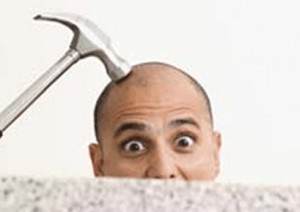Cleaning out the trunk of my car yesterday, I came across a stack of cassette tapes from a period in my life when I was so desperate I’d spend stupid sums of money on anything to remove my fear and anxiety.
These tapes were part of a program that cost me some $450. Each tape, sold by the Midwest Center for Stress & Anxiety, is designed to help people learn the skills to defeat anxiety and depression without medication.

I ordered the so-called free trial in 2006 after seeing all the late-night TV infomercials with Lucinda Bassett, mastermind of the program. I worked the program diligently. But overall, the program wasn’t even close to what I needed.
I called the Midwest Center before the free trial period was up to tell them I’d be sending the tapes and DVDs back. No go, an impatient phone rep told me. They had already charged the card number I gave them. No refund.
Meanwhile, I received a package of vitamins in the mail with ingredients designed to reduce stress and balance the brain chemistry. At first it struck me as odd, since the concept on paper was a lot like other pills the center typically railed against. They weren’t anti-depressant-caliber pills like Prozac. They were just vitamins. I saw them for what they were: an expensive placebo.
I never asked for the vitamins. Yet there they were, and they were charging me extra for something I didn’t order or want.
The phone reps basically told me too bad, they had already charged my card and there were no refunds. I should have read the fine print.
So, the program to attack anxiety and depression simply made those things rage within me even worse than before.
At some point, I dumped the tapes in a box in my trunk, forgot about them and moved on. I found more lasting tools to manage my OCD and the resulting fear, anxiety and depression, and that was the end of it.
When I found the tapes, I chucked them in the trash along with the rest of the rubbish I was clearing out of the car.
When I came back inside, I found myself looking up articles about the Midwest Center and found some surprising items.
First, I found obituaries for Lucinda Bassett’s husband, David Bassett, co-principal of the self-help empire. The various reports were that he committed suicide in June 2008. Having lived through the horror of loved ones committing suicide, I’m reluctant to say anything bad here. I feel badly for Lucinda Bassett. To lose someone you love that way is one of the worst things you could ever go through.
Still, I couldn’t help but find it sadly, painfully ironic that THIS GUY would end his own life.
Here’s something I found that was written shortly after Bassett’s death. The author is STEVE SALERNO, author/essayist, musician, teacher, and blogger. (Check out his SHAMblog) He wrote:
This past June 7 (2008), 53-year-old David Bassett walked onto a California beach and ended his life with a shotgun. This took place not far from the home he shared with his wife, Lucinda. If the names sound vaguely familiar, it’s because David and Lucinda Bassett were principals in the Midwest Center for Stress & Anxiety.Not a few of those who left their thoughts were refugees from the Center’s in-house discussion forum, where their critical remarks had been expunged or edited; a few claimed to have been banned altogether. Collectively, they seemed to feel they’d been abused, if not conned. The gist was that the Center had used misleading claims and credentials to charge them a lot of money for programs that didn’t work (or at least hadn’t worked for them). To be fair, a number of Center apologists also weighed in, and for a while we had a spirited, thought-provoking give-and-take going.A prospective customer might reasonably ask: If the Center’s programs can’t even prevent one of the Center’s owners from killing himself…?
I also found a site known as the Complaint Board, where a fellow by the name of Alfred logged his complaints about the Bassett empire:
Lucinda and David Bassett flood late night infomercial TV with their overpriced Attacking Anxiety and Depression schlock program. They advertise a ’30-day risk free trial’ for just $9.95, the so called ‘shipping/Handling charge’ (inflated as any typical infomercial ripoff), the hook being that the S/H charge is all you pay for the 30 day ‘trial period’.Then when you aren’t magically cured by this collection of cassette tape in 30 days, send it back with no obligation to pay the $75.00 a month that they bill your credit card for the next 6-7 months. Do not believe this CRAP for a minute. They start ripping you off immediately with the inflated shipping charge and then start removing your money 30 days from the ORDER DATE which typically is 10-14 days BEFORE the 30 day trial period STARTS. By the time the ’30 day trial’ is over they have already taken the first FULL payment of $75.00 (+ tax) by 2 WEEKS, even when you decide you don’t want to buy this craprogram. One of Lucy’s top-secret cures is to ‘Drink 8 glasses of water everyday’ and ‘quit smoking and drinking’ DUH!! Gee for such wisdom it only costs 450 bucks! If these amateur Pyschobees had a grain of credibility would they operate so Don Lapre-like? It will take weeks to get your refund (if ever) A wiser approach would be to work for the Bassett’s. Then you can buy the ‘program’ for $20 and save yourself $425 just 90% off the ripoff price they charge everyone else.
That sounded a lot like my experiences with the program.
To be fair, this program probably has worked for people. I’ve seen plenty of positive reviews over the years. It’s just that there is no one size fits all. What works for one won’t work for another. It’s the same with medication. What worked for me won’t necessarily work for the next guy or gal.
There’s always that roll of the dice.
I just don’t think it should cost someone $450 to handle the dice.
Here’s the real problem, though:
You can tell a person to read the fine print, but a depressed, anxious person isn’t thinking about the fine print when they’re up at 3 a.m. watching those infomercials.
A person like that is desperate, and when they see a TV program telling them how easily the program will work in their lives, they’re not thinking about the fine print. They hear the words “free trial” and dash for the phone with credit card in hand. They figure the credit card number is just a placeholder. They don’t expect to actually be charged. Sure, they’re engaged in stupid thinking. But when you’re mentally and emotionally sick, stupid thinking is a way of life.
That’s what this program is: A money-sucker that preys on desperate people.
The lesson here is that you can’t go for anything packaged as a quick fix.
Nothing — and I mean NOTHING — will cure you in 15 weeks or even 30.
Getting truly well is a process that takes years. And you are never cured.
That’s my personal experience, anyway.








